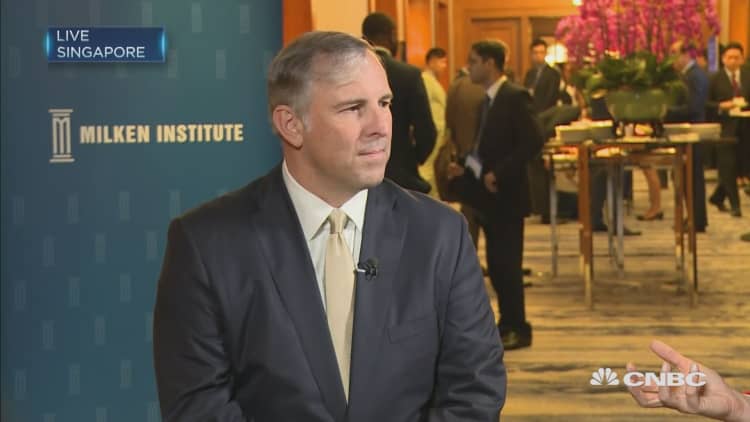
With bond yields spending years barely hovering above zero in most developed markets, big money investors are having to get creative to find returns.
For many, that means taking their money to riskier assets. Here's what some of the biggest names in fixed-income investing had to say this week at Milken Institute events in Singapore:
Joshua Friedman, Canyon Partners
For one, Joshua Friedman, co-CEO of Canyon Partners, said he's looking for investments that don't fit into what a standard exchange-traded fund or high-yield fund can hold and he's exploring ideas that are complex or distressed.
"In a low-yield and relatively complacent environment, don't be tempted by investments in things that are relatively interesting but low-yield and complacent," Friedman said on Thursday. "Try to invest in areas of disruption, of change, of uncertainty and try to find things where people are essentially by mandate forced to sell."
As an example, Friedman cited Canyon Partners — which says it has more than $20 billion under management — investments in bonds from Caesars Entertainment, which exited two-years of bankruptcy proceedings early this year.
As the company, among the U.S.'s biggest casino operators, struggled under a complex structure and heavy debt load, some of its bonds were trading at as little as 17 cents on the dollar, Friedman noted.
He added that, despite the recovery in the company's bonds, he still thinks there's more profit to be made. Friedman pointed to consumers' recent preference for experiences over products, which will make money for Las Vegas.
Steven Tananbaum, GoldenTree Asset Management
Friedman wasn't the only investor who said they were pursuing risky — but cheap — assets.
Steven Tananbaum, chief investment officer at GoldenTree Asset Management, said at the conference that he's looking at bonds from Argentina and Puerto Rico. Both of those places have defaulted on bonds in recent years.
But within those regions, he said, investors need to be discerning about which bonds they target.
"If you're just looking at Argentina debt, it's good value. But if you look at different areas of Argentina with the same risk, which would be the provinces, there's much better value," he said.
With Puerto Rico bonds, he said he was looking at those related to the Puerto Rico Sales Tax Financing Corporation (also known as Cofina), with some having their payments guaranteed by an insurer.
However, Tananbaum said he wasn't looking at the bonds rated as carrying the most risk, noting that they haven't performed well recently.
"Looking at history, this isn't a great time to be investing in triple-C," he said, referring to those considered extremely speculative and potentially even close to default.
GoldenTree manages over $25 billion, according to its website.
Thomas Finke, Barings
Thomas Finke, chairman and CEO of Barings, said his firm was looking at getting a stream of income from buying into assets other than bonds.
"There's a lot of opportunity as the economy is changing to invest in assets that generate cash flow. Think of things like trailers that go on the back of railroad cars and trucks. Think about things like media content," he said at the conference.
Similar opportunities would continue to arise, he said, as planned infrastructure projects proceed.
Barings is a $288 billion asset management firm as of the end of June, according to its website.
Liew Tzu Mi, GIC
Other investors at the conference were notable for their long time horizons.
Liew Tzu Mi, chief investment officer for fixed income at GIC, Singapore's wealth fund, said that just settling for high valuations and low returns on bonds wasn't sufficient.
Instead of waiting for companies to bring bond sales to the market, GIC seeks them out, she said on Wednesday.
"We go to companies that we like, we understand the balance sheet, we know that they can withstand a recession and then we go back and say, 'Hey, how about coming up with a financing solution,'" she said.
In addition, she said GIC was very interested in China's bond market, noting it was already the world's third largest despite its extremely low foreign ownership.
"I think we're still at the infancy, where investors are trying to get comfort around investing in China," she said. "But for us it's a huge opportunity because where else can you get, we think, a quality asset in terms of looking at reserves, in terms of the status of the currency at some point in the future."
She noted that Chinese bonds still had higher yields than many other bond markets. China's 10-year government bond was yielding around 3.6 percent, while the U.S. 10-year Treasury yield was around 2.2 percent.
"We think at some point these are going to be mainstream, this is going to be in the index, this is going to be in many people's portfolios," she said.
GIC, which manages Singapore's reserves, does not reveal its portfolio size, but on its website it said the amount was "well over $100 billion."
Correction: An earlier version of this article incorrectly stated GoldenTree CIO Steven Tananbaum's position on triple-C rated bonds. He said he doesn't believe this is an appropriate time to invest in the category.


